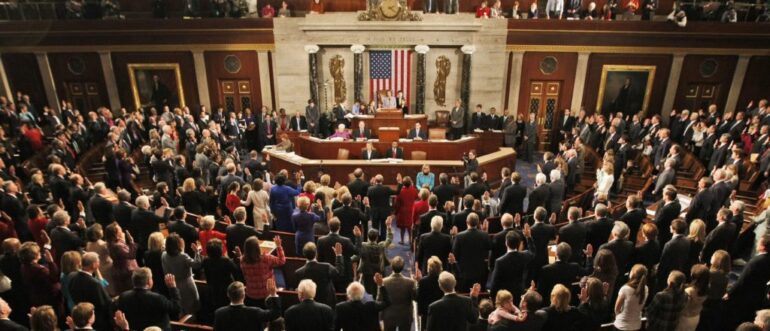TL;DR:
- Rep. Ted Lieu and Sen. Mike Rounds are dedicated to learning about AI and educating fellow lawmakers before crafting AI regulations.
- The Senate plans to hold informational meetings to educate senators on AI’s impact and government capabilities.
- Congress aims to assign responsibilities on a committee-by-committee basis and protect areas affected by AI.
- AWS executives and Maximus VP highlight AI’s real-world impact and its potential to double computing power every three and a half months.
- Maximus emphasizes the discerning use of AI to address specific mission problems and free up time for employees.
- Lieu cautions about the disruptive effects of AI on society and emphasizes the need for preparedness.
Main AI News:
In an era marked by technological advancements and transformative breakthroughs, members of Congress are immersing themselves in the realm of artificial intelligence (AI). While political ideologies may vary, representatives such as Rep. Ted Lieu, D-Calif., and Sen. Mike Rounds, R-S.D., share a common dedication to acquiring knowledge about AI and enlightening their fellow legislators. Their goal is to foster a deep understanding before venturing into the delicate task of crafting comprehensive legislation to effectively regulate this burgeoning field.
Lieu, who possesses a computer science degree, emphasized the importance of being in a continuous “learning mode” and expressed caution regarding the potential consequences of ill-informed actions. He stressed the need for thorough research and information gathering, recognizing the significance of precision when formulating acts of Congress. Lieu highlighted that any missteps in legislation would necessitate further corrective measures, which could be avoided through careful and measured progress.
During a panel discussion at Amazon Web Services’ Washington, D.C. Summit, Lieu was joined by Sen. Rounds, AWS executives, Bratin Saha (Vice President of AI and Machine Learning) and Olivia Igbokwe (Head of Congressional Affairs), as well as Kathleen Featheringham (Vice President of AI and Machine Learning at Maximus). This gathering of influential figures in the AI realm demonstrates the commitment to promoting knowledge sharing and establishing a solid foundation for informed decision-making.
As co-chair of the Senate AI Caucus, Rounds announced the Senate’s plan to organize three informational meetings to educate senators comprehensively. These meetings, two of which will be conducted privately, aim to foster open and candid discussions away from the public eye. The third meeting will be held in a classified setting, enabling in-depth conversations concerning the capabilities of the U.S. government and those of its adversaries.
Rounds highlighted the importance of delineating responsibilities within congressional committees, as AI’s impact permeates a wide range of sectors, including agriculture, healthcare, defense, law enforcement, and finance. With this in mind, he emphasized the urgency of identifying key leaders in the Senate and House, who can assemble diverse ideas and translate them into effective legislation. The delicate balance between promoting AI’s use and safeguarding citizens’ expectations necessitates thoughtful consideration and strategic planning.
The educational tour on AI undertaken by Congress aligns with the technology’s increasing influence on various industries. Saha, from AWS, shared insights into the widespread adoption of AI solutions across both the public and private sectors. Notably, the Department of Veterans Affairs leverages generative AI to streamline the process of determining eligibility for beneficiaries, showcasing the tangible benefits of AI in action.
Saha further highlighted the exponential growth of AI capabilities in recent years, surpassing the trajectory outlined by Moore’s Law. While Moore’s Law postulates that computing power doubles every two years, AI systems have been doubling their computing every three and a half months. This rapid acceleration in AI development signifies its potential to revolutionize numerous aspects of society at an unprecedented pace.
Featheringham, representing Maximus, acknowledged the immense enthusiasm surrounding AI while emphasizing the need for discernment and careful evaluation. Not every situation calls for AI integration, and its implementation should be aligned with specific mission requirements. By automating mundane and repetitive tasks, AI enables employees to redirect their energy and creativity toward more impactful endeavors.
Drawing from his own experience, Lieu, a trailblazer in the field, recognized the inevitable disruption that accompanies innovation. He likened the emergence of AI to historical transformative moments, such as the advent of the steam engine. While acknowledging the tremendous possibilities AI presents, Lieu urged fellow legislators to remain vigilant about the potentially disruptive effects on society. With the analogy of AI as a supersonic jet engine imbued with personality, Lieu emphasized the paramount importance of adequate preparedness.
As Congress embarks on an educational journey into the realm of AI, it endeavors to strike a delicate balance between embracing innovation and ensuring responsible governance. By acquiring knowledge, engaging in thoughtful dialogue, and contemplating the potential consequences, lawmakers are poised to navigate the complex landscape of AI regulation with prudence and foresight. Through collaborative efforts, Congress aims to shape a future that capitalizes on the transformative power of AI while safeguarding the interests of the citizens it represents.
Conclusion:
Congress’ proactive engagement with AI and dedication to knowledge acquisition demonstrates a recognition of the technology’s transformative potential. By fostering understanding, lawmakers are poised to shape responsible legislation that harnesses the benefits of AI while safeguarding the interests of various sectors. This commitment signals an evolving market where AI will play an increasingly prominent role, necessitating strategic planning and a balance between innovation and responsible governance. Market participants should anticipate an environment that encourages the use of AI while prioritizing ethical considerations and regulations to build public trust and ensure long-term sustainability.

